Building sits empty years after senior care residents evicted
The story was originally published by AsAmNews with support from our 2024 California Health Equity Impact Fund.
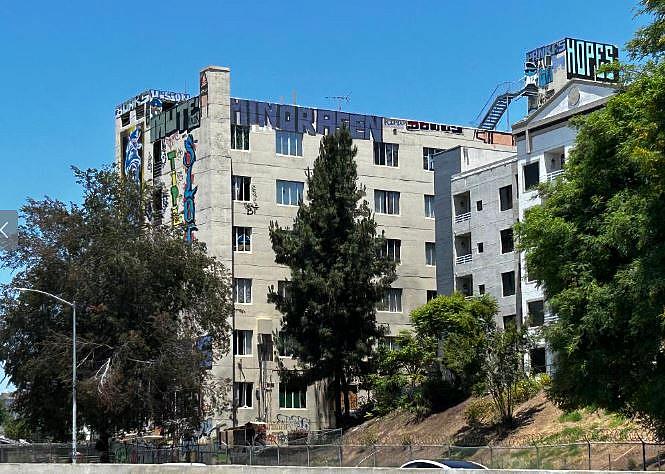
This abandoned building is the former location of Sakura Intermediate Care Facility.
Photo taken in June 2024 by Randall Yip, AsAmNews
The sign on a former care home in Los Angeles reads “VACATED building. DO NOT ENTER. The letters that spell vacated are all in caps and in large font.
A padlock on the door reinforces the DO NOT ENTER message.
The building in the Boyle Heights neighborhood of Los Angeles is the former location of Sakura Intermediate Care Facility. Sakura ICF evicted its residents from the home in the months leading up to its closure in August 2021.
David Monkawa of the advocacy group Save Our Seniors says a total of 90 seniors lived at the facility in November 2020 when its owners announced its intention to demolish the building to make way for market rate housing.
Four years later, the residences remain empty and there is no sign of construction beginning anytime soon.
On a June day, empty refrigerators and abandoned furniture lined the area outside the former Sakura ICF.
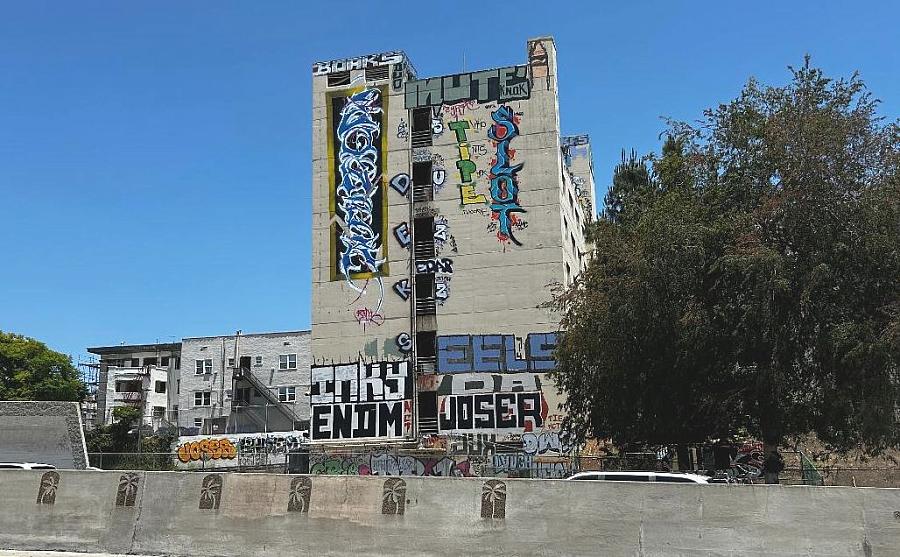
Graffiti could be seen from top to bottom at the former Sakura Intermediate Care Facility in June 2024.
Photo by Randall Yip, AsAmNews
Graffiti vandals had turned the multi-story building into their canvas. Motorists couldn’t help noticing the graffiti that extended from top to the bottom of the facility’s exterior as they zipped by the seven-story building.
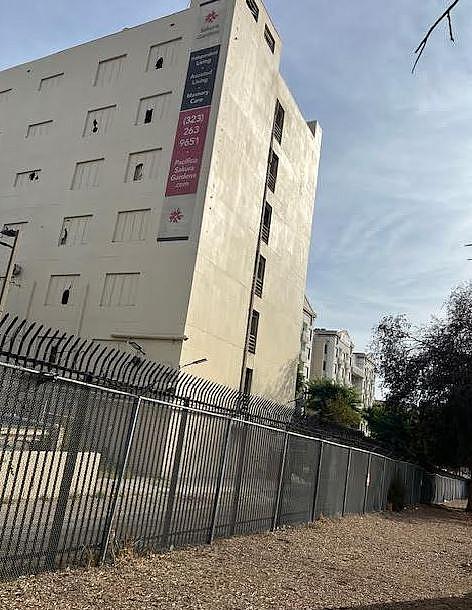
The former Sakura Intermediate Care Facility.
Photo taken December 2024 by David Monkawa
Today, the graffiti has been painted over and while a refrigerator and a few scattered items remain near a debris box, much of it has been cleaned up.
We’ve learned the city had issued an order to clean up the property in May.
Questions remain, however, about why its owners Pacifica Boyle LLC felt the urge to evict its formally elderly residents.
The Department of City Planning in Los Angeles confirms it terminated the application for demolition in October 2021. It says Pacifica failed to respond to requests for additional information.
The city denied the permits for demolition just two months after the last tenant was evicted, an eviction that had been protested by members of the Asian American community.
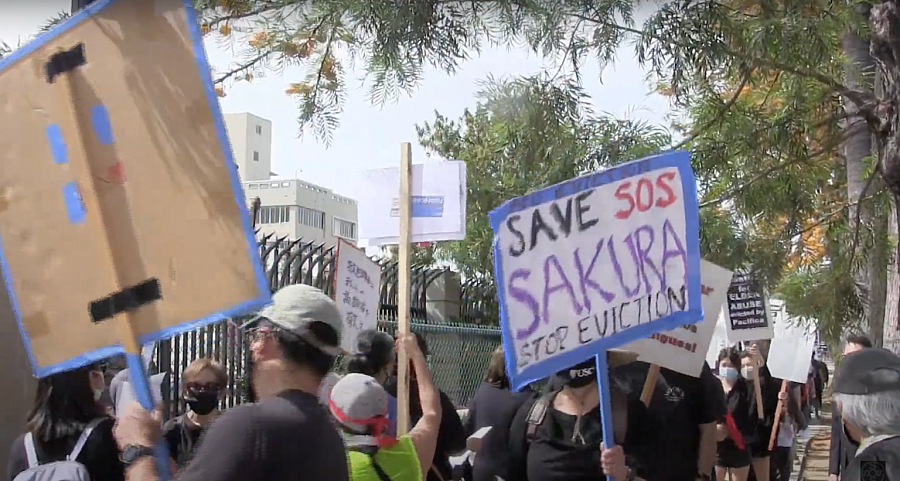
A protest held in 2021.
From Save Our Senior YouTube channel
Calls to Pacifica about its future plans for the building have not been returned.
On its website, Pacifica describes itself as a privately owned real estate firm with holdings in 22 states as well as India and Mexico. It is invested in hospitality, senior housing, multifamily, commercial development, land acquisition, residential development, debt acquisition and Real Estate Owned properties usually attained after failed foreclosure auction sales.
“It’s a horrific tragedy that’s still standing there – boarded up and empty. It means that all the seniors that have since died could have spent their last years of enjoyment at the facility,” said David Monkawa of Save our Seniors, a Japanese American advocacy group in Los Angeles.
Francine Imai’s mother, Sumiko Kawaoka, was among those forced to leave the facility.
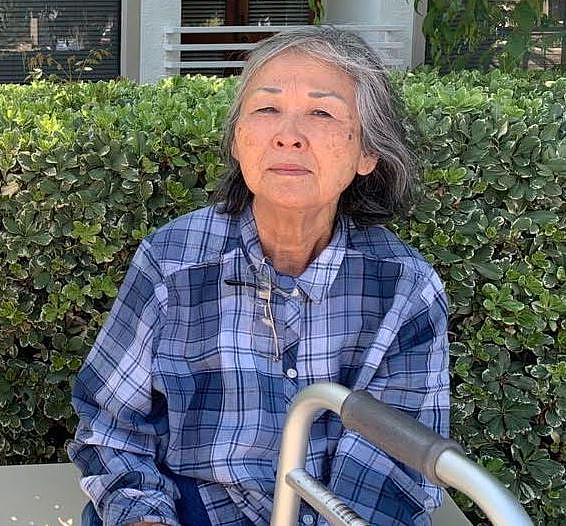
Sumiko Kawaoka
Photo courtesy Francine Imai
“My mother actually became very ill because she did not want to leave the facility. She wanted to stay at Sakura ICF so she stopped eating. She got very depressed,” Imai told AsAmNews.
Her mother died four months after being transferred to a new facility.
Kenneth Nakayama’s mother, Tomiko Nakayama, also had to leave Sakura ICF due to its closure. The fact that the building sits empty three years after its closure bothers him, but what upsets him even more is the 2016 sale of Sakura ICF by the non-profit Keiro.
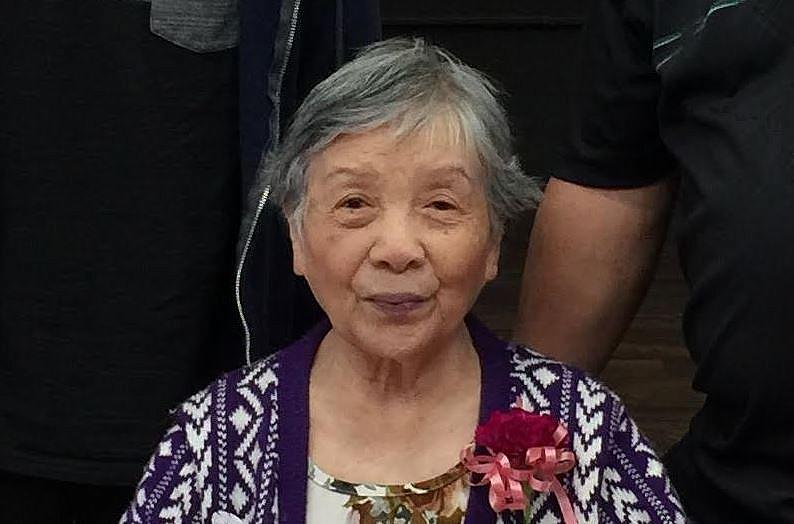
Tomiko Nakayama, mother of Kenneth Nakayama
Courtesy Kenneth Nakayama
His late mother had been a resident at Sakura since 2013.
The long-time Japanese American non-profit sold Sakura ICF and three other senior facilities it ran to Pacifica for $41 million in 2016.
“I feel angry about that. I feel that they basically betrayed the original promise that the eight founders made to the Japanese American community to keep providing these services to its elderly,” he said to AsAmNews.
Eight years after the sale to Pacifica by Keiro, emotions remain strong by many in the Japanese American community that Keiro should not have sold its properties.
Beverly Ito, a former manager at Sakura ICF, now is executive director of Keiro. She did not return our calls, but did send us comments in the form of a letter.
“After several years of analyzing industry and community trends and hosting discussions with leading experts in the field of aging, the Keiro Board made the very difficult decision to sell its care facilities,” she wrote.
“Keiro has remained steadfast in its support of the legacy residents and former facilities by providing culturally sensitive entertainment, activities, food and supplies. This support now extends to other facilities serving Japanese and Japanese American residents.”
The sense of betrayal remains strong among some members of the Japanese American community eight years after the sale. They say the community donated money for decades to Keiro to keep the facilities running.
As AsAmNews has previously reported, one of the other facilities Keiro sold to Pacifica, Kei Ai Los Angeles, saw more deaths from COVID than any other nursing home in the state, 115. That home was cited for repeated violations of COVID safety protocols.
However, Ito points out that Keiro had nothing to do with those deaths as the pandemic occurred some four years after the completion of the sale.
“Keiro mourns the passing of all people who lost their lives to COVID-19. We also acknowledge the dedication of all caregivers, paid and unpaid, who made many personal sacrifices to provide compassionate and supportive care.”
The two other homes sold by Keiro to Pacifica were Kei Ai South Bay in Gardena and Sakura Gardens.
Sakura Gardens sits in the same parking lot as the former Sakura ICF and remains open as does Kei Ai South Bay.
A search of Keiro’s tax records shows the non-profit had net assets of $33 million the year it finalized the sale. Those assets have since risen to nearly $81 million in 2022, the last year its tax filing is publicly available.
Nakayama remains in disbelief
“There’s a bigger picture. The financial status of Keiro Health Care wasn’t so that it needed to sell. There excuse was that they were losing money; they had plenty of money to cover the deficit.”
